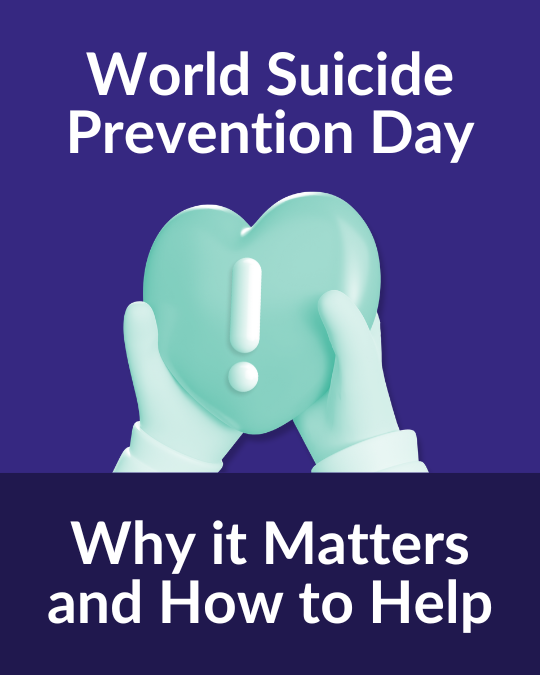Contents
This blog includes:
- National statistics on suicide
- The impact of suicide on communities
- The importance of open conversations and how to have them
- Resources available in the UK
- FAQ
World Suicide Prevention Day (WSPD) takes place annually on 10th September. This year’s theme is Changing the Narrative on Suicide.
The campaign’s goal is to encourage more open and honest conversations about suicide. Through this, we can improve understanding and empathy, and even save lives.
Statistics on Suicide
While the topic of suicide is difficult to talk about, it is an important matter of public health.
Suicide is the main cause of death in people under the age of 35 in the UK (Papyrus).
In 2023, 7,055 people died by suicide in the UK (House of Commons Library, 2025). This was the highest UK suicide rate since 1999 (British Safety Council). In comparison, 1,695 people in the UK died from road accidents in 2023 (Brake). Just as we continually work to improve road safety, we also need to create a safer world for those at risk of suicide.
Not only does suicide pose a direct risk to those who could lose their lives, it also impacts their families and communities. In a 2022 study, 77% of those bereaved by suicide experienced major impacts, including mental health problems (37%). 38% reported suicidal ideation.
This demonstrates the need for open conversations to prevent suicide and to support those bereaved by suicide.
How Can Open Conversations Help Prevent Suicide?
Open conversations can:
- Provide an outlet to vent or to process complex emotions
- Direct people towards resources available to them
- Identify whether a person is at risk
- Challenge stigma and foster acceptance
- Save lives and reduce suffering
These conversations can take place at home, in workplaces and schools, and even online.
Tips for open conversations:
- Simply being present and listening can make a huge difference
- Regular check-ins and follow-up conversations can help
- Look out for warning signs, such as mood swings or withdrawal
- Point towards resources and services
Mental Health Education and Accreditation
At Advantage Accreditation, our goal is to improve the standard of training across a range of sectors. We assess courses based on robust criteria and ensure content aligns with up-to-date regulations and guidance from national bodies.
While many mental health resources are available, we feel it is important that educational content is based on official guidance and peer-reviewed studies.
We offer ready-to-use course materials to our accredited centres for:
- Level 1 Award in Mental Health, Dementia and Learning Disability Awareness
- Level 2 Award in Loss and Bereavement
- Level 2 Award in Mental Health Awareness
- Level 2 Award in Self-Harm Awareness
- Level 2 Award in Suicide Awareness
We also accredit original courses from our centres.
If you are interested in delivering our course materials as an accredited training centre, or in getting your original course accredited, please contact Advantage.
What Support is Available?
There are several support services available to individuals experiencing suicidal thoughts and affected communities.
Support services for individuals experiencing suicidal thoughts:
Samaritans – In-person help is available at branches across the UK. Anyone can call on 116 123 at any time.
Campaign Against Living Miserably (CALM) – Anyone can call between 5pm and midnight every day on 0800 58 58 58. There is also a live online chat option at thecalmzone.net from 5pm to midnight every day.
Papyrus – Young people (aged under 35), or anyone worried about a young person, can call 0800 068 41 41 at any time.
Childline – Children can access support any time by calling 0800 1111 or chat online at childline.org.uk to talk to a counsellor.
Shout – Text-based support is available 24 hours a day, 7 days a week. Text SHOUT to 85258.
Support services for those bereaved by suicide:
Survivors of Bereavement by Suicide (SOBS) – Anyone can call 0300 111 5065 every day between 9am and 7pm. They also offer in-person and virtual support groups. Go to uksobs.com to find a support group.
If U Care Share – Young people can call the helpline on 0191 387 5661 between 9am and 5pm, Monday to Friday. They also offer a free and confidential text service. Text IUCS to 85258.
Winston’s Wish – Young people, or adults supporting grieving children, can call 08088 020 021 between 8am and 8pm, Monday to Friday.
Frequently Asked Questions about World Suicide Prevention Day
What is World Suicide Prevention Day (WSPD)?
A day to promote suicide awareness and prevention across the globe. This takes place annually on 10th September.
How does WSPD’s theme apply?
This year’s theme of Changing the Narrative on Suicide encourages honest and open conversations that can change perspectives and reduce stigma.
What support is available in the UK?
Those experiencing suicidal thoughts can access 24/7 support by phone (Samaritans) or text (Shout). Those bereaved by suicide can access a helpline or support group though Survivors of Bereavement by Suicide (SOBS).
Someone I know is struggling. How can I help?
Follow our tips on having open conversations, including listening, checking in, looking for warning signs, and recommending resources.
Key Takeaways
- Suicide is a prevalent and important public health issue that should not be ignored.
- Through open conversations, we can help reduce stigma and potentially save lives.
- Many support services are available, including Samaritans and Survivors of Bereavement by Suicide (SOBS).

